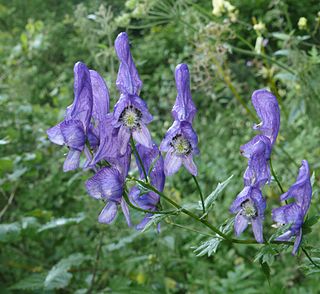
Aconitum, also known as aconite, monkshood, wolf's-bane, leopard's bane, mousebane, women's bane, devil's helmet, queen of poisons, or blue rocket, is a genus of over 250 species of flowering plants belonging to the family Ranunculaceae. These herbaceous perennial plants are chiefly native to the mountainous parts of the Northern Hemisphere in North America, Europe, and Asia; growing in the moisture-retentive but well-draining soils of mountain meadows. Most species are extremely poisonous and must be dealt with very carefully. Several Aconitum hybrids, such as the Arendsii form of Aconitum carmichaelii, have won gardening awards — such as the Royal Horticultural Society’s Award of Garden Merit. Some are used by florists.

Delphinium is a genus of about 300 species of perennial flowering plants in the family Ranunculaceae, native throughout the Northern Hemisphere and also on the high mountains of tropical Africa. The genus was erected by Carl Linnaeus.

Chhaang or chang is a Nepalese and Tibetan alcoholic beverage also popular in parts of the eastern Himalayas, Limbu people, Newar, Sunuwar, Rai, Gurung, Magar, Sherpa, Tamang and Lepcha communities. Among the Lepcha, it is called Chi.

Pseudaconitine, also known as nepaline (C36H51NO12), is an extremely toxic alkaloid found in high quantities in the roots of Aconitum ferox, also known as Indian Monkshood, which belongs to the family Ranunculaceae. The plant is found in East Asia, including the Himalayas.
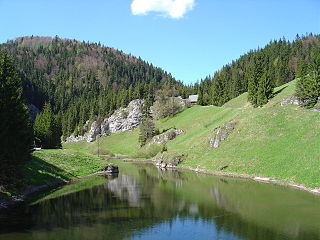
Slovak Paradise is a mountain range in eastern Slovakia. It is a part of the Spiš-Gemer Karst, which in turn is a part of the Slovak Ore Mountains, a major subdivision of the Western Carpathians. It is located between the towns of Spišská Nová Ves in the north and Dobšiná in the south. It is particularly known for its gorges and waterfalls. It is very popular with hikers as it has a number of unusual routes through gorges and waterfalls. There are numerous sections where fixed ladders are used to climb. The area is protected by Slovak Paradise National Park.

Aconitum lycoctonum is a species of flowering plant in the genus Aconitum, of the family Ranunculaceae, native to much of Europe and northern Asia.
Arrow poisons are used to poison arrow heads or darts for the purposes of hunting and warfare. They have been used by indigenous peoples worldwide and are still in use in areas of South America, Africa and Asia. Notable examples are the poisons secreted from the skin of the poison dart frog, and curare, a general term for a range of plant-derived arrow poisons used by the indigenous peoples of South America.
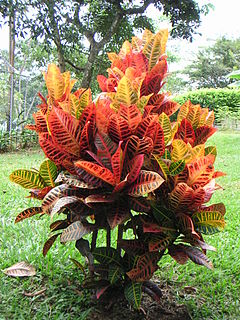
Codiaeum variegatum is a species of plant in the genus Codiaeum, which is a member of the family Euphorbiaceae. It was described by Carl Linnaeus in 1753. It is native to Indonesia, Malaysia, Australia, and the western Pacific Ocean islands, growing in open forests and scrub.
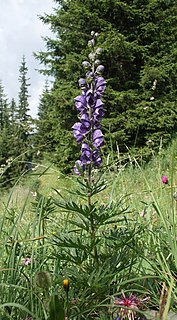
Aconitum napellus, monk's-hood, aconite or wolfsbane, is a species of highly toxic flowering plant in the genus Aconitum of the family Ranunculaceae, native and endemic to western and central Europe. It is an herbaceous perennial plant growing to 1 m tall, with hairless stems and leaves. The leaves are rounded, 5–10 cm (2.0–3.9 in) diameter, palmately divided into five to seven deeply lobed segments. The flowers are dark purple to bluish-purple, narrow oblong helmet-shaped, 1–2 cm (0.39–0.79 in) tall. Plants native to Asia and North America formerly listed as A. napellus are now regarded as separate species. The plant is extremely poisonous in both ingestion and skin contact.

Polygonatum odoratum syn. P. officinale, is a species of flowering plant in the family Asparagaceae, native to Europe, the Caucasus, Siberia, the Russian Far East, China, Mongolia, Korea and Japan. In the United Kingdom it is one of three native species of the genus, the others being P. multiflorum and P. verticillatum.

The Circumboreal Region in phytogeography is a floristic region within the Holarctic Kingdom in Eurasia and North America, as delineated by such geobotanists as Josias Braun-Blanquet and Armen Takhtajan.

Bažantnice u Pracejovic is a Nature reserve near the town of Strakonice, Strakonice District, in the Czech Republic. The reason for protection of this area is the occurrence of a riparian forest relict in the Otava River bed with relatively preserved tree and herb layer with typical types of riparian forest. For example, in the area grows Aconitum variegatum, Hottonia palustris, Thalictrum aquilegiifolium, Corydalis intermedia, Primula elatior, Carex riparia, or Lemna trisulca.

Gigactonine is a naturally occurring diterpene alkaloid first isolated from Aconitum gigas. It occurs widely in the Ranunculaceae plant family. The polycyclic ring system of this chemical compound contains nineteen carbon atoms and one nitrogen atom, which is the same as in aconitine and this is reflected in its preferred IUPAC name.
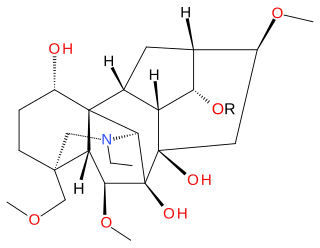
Delsoline and delcosine are two closely related naturally occurring diterpene alkaloids first isolated from Delphinium consolida. They occur widely in the Ranunculaceae plant family. The polycyclic ring system containing nineteen carbon atoms and one nitrogen atom in these compounds is the same as in aconitine and this is reflected in their preferred IUPAC name.

Dipodium variegatum, commonly known as the slender hyacinth-orchid, or blotched hyacinth-orchid, is a leafless mycoheterotrophic orchid that is endemic to south-eastern Australia. It forms mycorrhizal relationships with fungi of the genus Russula.

Colchicum variegatum, common name Κολχικό το ποικιλόμορφο or Güz Acıçiğdemi, Sürincan is a plant species native to Greece and Turkey but cultivated in many other places.

Aterpia corticana is a species of moth of the family Tortricidae.

Aconitum firmum is a species of monkshood that is found in Southern Poland, Slovakia, and Czechia, with a few instances in Ukraine and Romania.
Allium variegatum is a species of plant in the amaryllis family and is native to Turkey.

Aconitum lasiostomum is a species of flowering plant in the genus Aconitum, native to Eastern Europe.


















